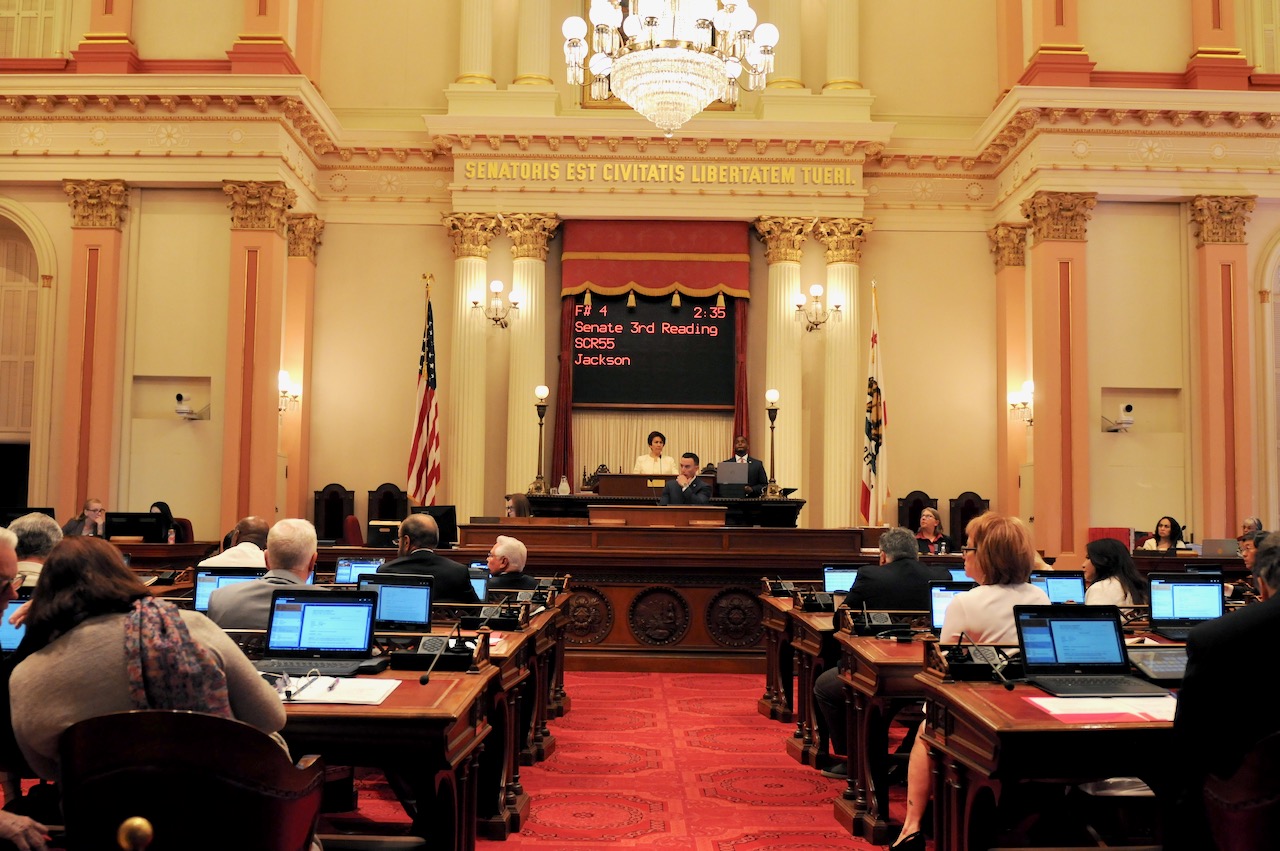
Senator Shannon Grove. (Photo: grove.cssrc.us)
California Oil Prioritization Bill Unanimously Passes Sen. Environmental Quality Committee
‘California needs this focus on production, especially over foreign imports – not more oversight’
By Evan Symon, March 29, 2023 5:21 pm
A bill to prioritize California oil production over certain foreign imports was passed unanimously by the Senate Environmental Quality Committee on Wednesday, less than a day after Governor Gavin Newsom signed the SBx1-2 oil company oversight bill into law.
Senate Bill 15, authored by Senator Shannon Grove (R-Bakersfield), would express the intent of the Legislature that the Energy Commission monitor foreign countries that export oil to California and identify on its internet website which of those countries have demonstrated human rights abuses and which of those countries have lower environmental standards for the production of oil than California. SB 15 would also require the state board to annually produce an assessment of the greenhouse gas emissions associated with the transportation of oil in California and to include that assessment on the board’s internet website.
In addition, the bill would require the Energy Commission to annually provide data collected pursuant to the Petroleum Industry Information Reporting Act of 1980 to the state board for the purposes of the assessment. Finally, the bill would also bill require the division to provide a link on its internet website to air quality emissions data associated with the transportation of oil imported into the state.
Senator Grove wrote the bill due to many negative policies in oil exporting countries, the high high price of gas in California, and to bring back thousands of oil and petroleum based jobs lost in recent years.
“If the Governor and legislative Democrats are serious about lowering the price of gasoline in California, they should immediately pass SB 15,” said Senator Grove on Wednesday. “Why would we import millions of barrels of oil from countries hostile to our values when we can produce the most climate compliant oil right here, by Californians for Californians?”
“California is the seventh-largest oil-producing state in the nation. Of the 1.8 million barrels of oil consumed in the state each day, less than 400,000 are produced by in-state workers. All of the oil and gas produced in the state is consumed by Californians. However, the state’s demand for oil means consumers will send more than $25 billion a year to other countries to make up the difference with imported oil. The top two countries that California imports its oil from are Saudi Arabia, where women are not allowed to drive, and Ecuador, where the Amazon Rainforest is being bulldozed down to meet the demand for California’s consumption.”
“Much of the oil we import could be replaced by California’s in-state producers, providing California jobs, if the Governor would release the 1000+ permits sitting at CalGem. By relying on expensive foreign oil imports, we have placed California’s energy security into the hands of countries that are actively hostile to California’s values when it comes to human rights, labor rights, and environmental rights.”
“SB 15 would begin a process to bring back to California the thousands of jobs that have been lost to foreign countries that do not share our democratic values or respect for the environment. California can produce much of the oil we import and keep the jobs and revenues inside our Golden State while protecting our environment and securing our energy supply.”
SB 15 and SBx1-2
Despite many legislators questioning the need for the bill, SB 15 passed the Senate Environmental Quality Committee unanimously on Wednesday. Like previous similar bills such as SB 1319 in 2022, SB 15 is expected to continue on in the Senate before facing a more challenging Assembly. The controversial SBx1-2 oil company oversight and accountability bill, which was passed by the Assembly on Monday and signed into law by Governor Newsom on Tuesday, is also seen as a major hurdle along with many recent oil production limiting bills and local laws, as oil extraction under SB 15 could be particularly stymied as a result.
“Californian leaders have largely been on the warpath against oil companies for years, despite relying on them for a sizeable amount of taxes,” explained natural resources extraction consultant Scott Crown to the Globe on Wednesday. “Even if SB 15 passes, there are a whole host of offshore oil laws, new oil well laws, extraction laws, and so many others that it could be difficult to bring oil production close to where it once was even recently in California.”
“That joke of a law just passed, the accountability one, all companies currently pumping oil in California would face that, even smaller companies just operating a few pumpjacks here and there. California needs this focus on production, especially over foreign imports and to maybe help bring the cost down. What they didn’t need was more oversight. We are transitioning away from oil to electric. That’s where we are going as a country, and there’s nothing wrong with it. But we can take these steps now to improve things for us now. Looking long-term is great, but we also need to look short-term too.”
SB 15 is expected to be heard next in the Senate Energy, Utilities and Communications Committee next month.
- Safeway Announces Closure Of Fillmore District Store In SF Due To Safety Issues, Thefts - December 12, 2024
- Rep. Kiley to Introduce Bill to Eliminate All Federal Funding For California High-Speed Rail Authority - December 11, 2024
- Trump Selects CA Lawyer Harmeet Dhillon As Assistant Attorney General For Civil Rights - December 11, 2024





Unfortunately, increasing oil and fuels production in California is a losing cause. If Sacramento doesn’t directly shut the industry down, CARB, SCAQMD, BAAQMD, RWQCB Boards, EPA, USCG, SLC, and various other local entities certainly will. As a result of their regulations, the politicians in Sacramento are more than happy to have these agencies do their dirty work for them. Both POLA and POLB are becoming “clean” ports and that means making the lives of the oil industry, or anything related, very difficult. Try getting a permit on almost anything. Remember, gasoline starts to go away in 2035 so which oil company wants to invest in anything in California. If alternative fuels are unable to step up by then, be prepared for much higher prices and waiting in lines.
What I find really offensive about Newsom’s war on big oil and their workers in California, is his own connection to the Getty family. It was J. Paul Getty and his first son Gordon (committed suicide) who made millions by importing oil from the Middle East (Saudi Arabia and Kuwait). I am surprised that this LA Times article about alleged tax “avoidance/evasion” has not resurfaced: https://www.latimes.com/business/story/2022-06-21/the-getty-oil-fortune-a-family-scandal-and-an-alleged-tax-scam.
Here’s a teaser exerpt:
“Things came to a head in 2018, when all three sisters were mostly living in California and became aware of the state’s “throwback” rule, which allows California to tax trust income if it determines that the recipients were state residents at the time they received the money and while it was accumulating in the trust.
The Getty family, Sonn asserts, was counting on its political pull in California to minimize that possibility, but that was a “calculated risk.” Among their connections is Gov. Gavin Newsom, whose father, Bill, was a lifelong friend and a financial manager of Gordon Getty’s. Gordon, who is now a business partner of Gavin Newsom’s, and other family members have contributed hundreds of thousands of dollars to Newsom’s political campaigns over the years.
The burden of hiding their California presence began to weigh on the sisters, according to Sonn. Her lawsuit says they wanted to live openly in California and stop worrying about taxes.”
Where there is smoke, there is usually a fire. Where is the media on this one?
P.S. Although 50 pages long, the lawsuit is a fascinating read imo (if you have the time and interest). The bonus is that a person can learn a lot about the administration of trusts. 😉 https://assets.bwbx.io/documents/users/iqjWHBFdfxIU/rNgcz6xH5Hyc/v0. 😉